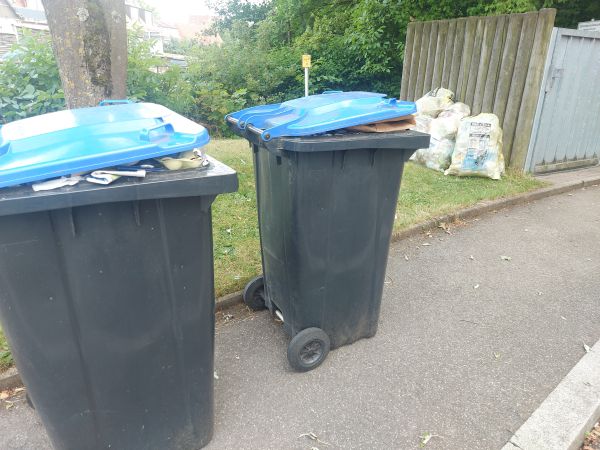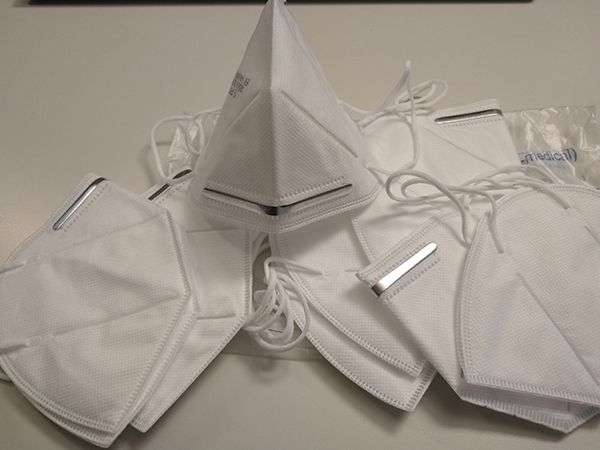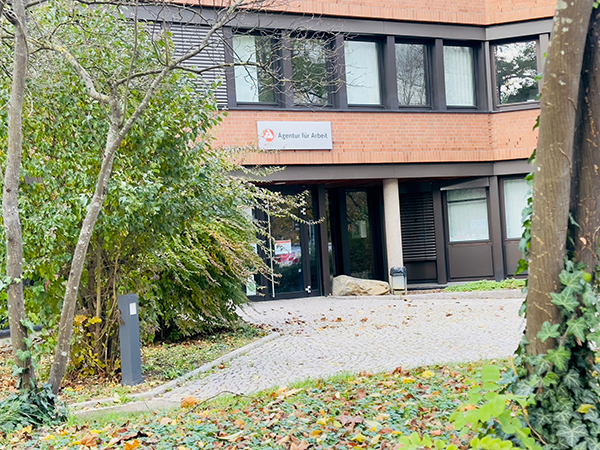In Germany, trash doesn’t just end up in a big garbage can. In order to be able to recycle as many materials as possible, the individual types of waste must be collected separately. That’s why every household has different trash containers. There are separate collections for paper, cardboard, glass and hazardous waste. Twice a year, shredded material from private gardens is also collected free of charge. Each household must register for garbage collection, then receives appropriate garbage cans and must pay fees. The costs depend on the size of the bin and, in the case of residual waste, also on the number of times it is emptied. Details can be found on the homepage of the waste management company of the district of Tübingen. https://www.abfall-kreis-tuebingen.de/ There you can also read about how waste can best be avoided.
The most important distinction in the household in the district of Tübingen is that between residual and organic waste.
Green garbage can: The green garbage can is reserved for organic waste—everything biodegradable from potato peelings to food scraps. The material is composted. It is important that the organic waste is not contaminated with plastic—this would interfere with the composting process. Therefore, according to the waste management company, no plastic bags are allowed in the garbage can. During the summer, the bio garbage can is emptied weekly in the district of Tübingen, and every two weeks during the winter months.
Gray garbage can: Most non-organic waste goes into the gray garbage can, the residual waste. This applies to the broken plate as well as to the contents of the diaper pail. The residual waste is incinerated at the Stuttgart-Münster waste incineration plant. This generates electricity and heat.
Recycling: However, a whole range of materials should not be put in the residual waste garbage can in the first place, for example because they contain valuable raw materials. A detailed list can be found in the Waste ABC of the Tübingen District Office. https://www.abfall-kreis-tuebingen.de/abfall-abc/
The best-known recycling objects are glass bottles: they are collected in the household and taken to the bottle bank. Packaging waste also has no place in residual waste. That’s what the yellow sack is for.
Yellow sack: Packaging materials such as blister packs and food cans are collected in the yellow sack. In principle, the yellow sack is reserved for lightweight packaging made of plastic, aluminum, tinplate and composite materials—for example, beverage cartons. The yellow bags are collected approximately once a month. By the way, defective plastic buckets or kitchen strainers have no place in the yellow bag—simply because they are not packaging waste.
Bulky waste: The broken sofa or the old mattress do not fit into the residual waste garbage can. On the website of the waste management company, you can request special collections for wood, metal and electrical waste. Special fast collection of bulky waste is also possible, but costs 50 euros. In addition, bulky items can also be delivered to the Dußlingen waste disposal center by car. For the first time this year, authorization codes and tokens were sent out with the waste fee notice. https://www.abfall-kreis-tuebingen.de
Blue garbage can: Paper is also a recyclable material. For waste paper, you can order a free blue garbage can from various providers or bring the waste paper to the containers yourself. Associations also collect waste paper from time to time. https://www.abfall-kreis-tuebingen.de/aktuelles/altpapier-2018/
Problem materials: Some materials are toxic and can contaminate groundwater. They must not be poured down the toilet or placed in the residual waste. This applies, for example, to leftover paint and varnish or old batteries. Problem materials from private households can be handed in free of charge at the problem material collection points. This also applies to energy-saving lamps / fluorescent tubes and recyclable materials such as small electrical appliances, cooking oils, cooking fats and corks.
tun23071101
In Deutschland werden die einzelnen Abfallsorten getrennt. Foto: tünews INTERNATIONAL / Linda Kreuzer.
002048




